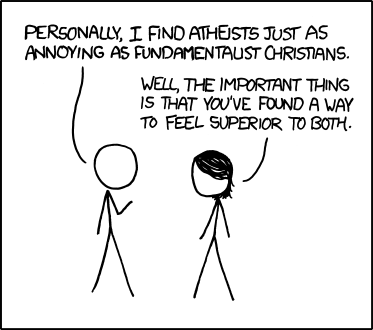People who call themselves "agnostic" can** be really obnoxious. On thing that seems to be a common trend amongst such people is this point that we can neither prove nor disprove god and that arguments between theists and atheists are pointless. It is a reasonable sounding idea, but it has a huge problem of not defining the term "god." What these agnostics seem to mean when they use this term is a deistic form of god, which is one that created the universe, but otherwise does not interact with humans.
I have very few problems with such a god. In fact, I can agree with the agnostics' claim. The next problem, though, is that when people talk about "god," that's not the god they are talking about. When theists, for example, claim that homosexuality is an abomination as per their god, that's really not a deistic god that they describe.
Additionally, even claims about what could be a deistic god can fly in the face of known science. When theists claim that humans were created in their god's image, they could be talking about a deistic god — or, at least this is an action that could be compatible with such a definition. But we have evidence that this is not so and that humans evolved from ape-like ancestors. So I'm going to reject that god. I really don't care if I can't "disprove" it.
This is where the intellectual integrity of such an agnostic stance begins to break down. If the agnostic is going to tell me that I can't reject a god concept that flies in the face* of what is known about the world, then they are essentially advocating for relativism, which is "the concept that points of view have no absolute truth or validity, having only relative, subjective value according to differences in perception and consideration." In other words, it can be true for me that humans evolved and be true to some theists that humans were created. Or, likewise, true for me that homosexuality is not an abomination and be true to some theists that it is.
To be somewhat "fair" to the agnostics, I suspect that many of them really aren't relativists. It's probably more like what the classic XKCD comic suggests — they are trying to make themselves feel superior by trying to make themselves sound like they hold an intellectually superior position. This, though, is probably even worse than holding a relativist view. Because it's snobbish. And dishonest. I'll take an opponent who holds an intellectually bankrupt position any day over a dishonest snob who pretends to be intellectually superior.
UPDATE: Two things. One, I may be overstating my case. Slightly. These agnostics may not necessarily be relativists, but they may still be close enough. At the very least, they may not have a good understanding of how we do discover what is true. Or, perhaps they don't think the scientific method or other methods of empirical observation are good methods for finding truth. Still, this really doesn't make things better. Two, I should have said that if someone makes a claim about their god that flies in the face of what we know about the world, they had better present a lot of evidence to back up their claim! It could be that what we think we know is actually wrong.
* Alternatively, if they are going to tell me I can't reject such a god concept because I can't reject this generic universe-creating god concept, then that's just stupid. It's a different claim, despite the similarities it may have with the generic concept.
** Disclaimer: I hope it is clear that I'm not out to criticize all people who label themselves agnostics. I'm only out to criticize those who have the views as described.


No comments:
Post a Comment